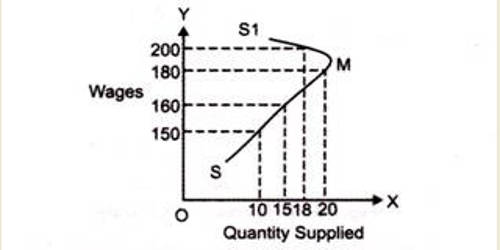Supply means the quantities that a seller is willing and able to sell at different prices. It is obvious that if the price goes up, he will offer more for sale. But if the price goes down, he will be reluctant to sell and will offer to sell less. Supply thus varies with price, Just as we cannot speak of demand without reference to price and time, similarly, we cannot speak of supply without reference to price and time.
Supply is always at a price, The supply of any goods may then be defined “as a schedule of respective quantities of the good which people are ready to offer for sale at all possible prices.” Just as demand implies a willingness and ability to pay, in the same manner, the phrase ‘ready to offer for sale’ in the definition of supply given above implies both willingness and ability to deliver the goods.
There are some exceptions to the law of supply:
- In an auction, goods arc sold away whatever the bid. It is possible that the seller is badly in need of money and wants a certain amount of it. As soon as that amount is s made up, he will refuse to sell more. The higher the price, the smaller the quantity he will need to sell in order to get the required amount. It is also possible that a person wants to get rid of a number of goods as in the case of a person going abroad. In such a case, he will sell away all that he has, whatever the price offered.
- When a further heavy fall in price is expected, the sellers may become panicky. They will sell more even if the price falls.
- These exceptions, however, do not falsify the law of supply enunciated above generally the law holds good. Extension and Contraction of Supply and Increase and Decrease of Supply. As in the case of demand, so in the case of supply, a distinction is made between extension and contraction on the one hand, and increase and decrease, on the other. This is, in fact, a distinction between a movement along the supply curve and a shift of supply Curve.
In some situations, the slope of the supply curve may be reversed –
- Regressive Supply – This may occur for example in some labor markets were above a certain level, higher wages have a disincentive effect as the leisure preference becomes high.
- Fixed Supply – This will be true in the short term of the supply of all things, particularly raw materials and agricultural products since time must elapse before it is physically possible to increase output.
Extension and Contraction, i.e. Movement along the Supply Curve: When the quantity offered for sale increases or decreases merely because the price has risen or fallen, we use the extension and contraction of the term of supply. The supply schedule is the same and we travel up and down the same supply curve.
Increase and Decrease, i.e., Shift of the Supply Curve: If on the other hand. the change in the quantity offered for sale is caused, not by a change in price, but by a change in the conditions of supply, we say that supply has increased or decreased or the supply curve has shifted from its previous position. The change in the condition of supply implies a change in the technical conditions: perhaps a new process or a new material has been discovered, a new labor-saving device has been discovered, or raw materials and other factors have become cheaper.
On account of these new developments, the manufacturer may be able to offer more for sale even if the price has remained the same or gone down. If the conditions have become unfavorable, he will not be able to supply the same quantity at the old price. Extension of supply means that more is offered at a higher price, while an increase in supply signifies that either more is offered at the same price or the same quantity is offered at a lower price.
Contraction and decrease in supply are the opposites of extension and increase in supply respectively. Contraction of supply means that less is offered at a lower price, but decrease in supply means that less is offered at the same price or the same quantity is offered at a higher price.












